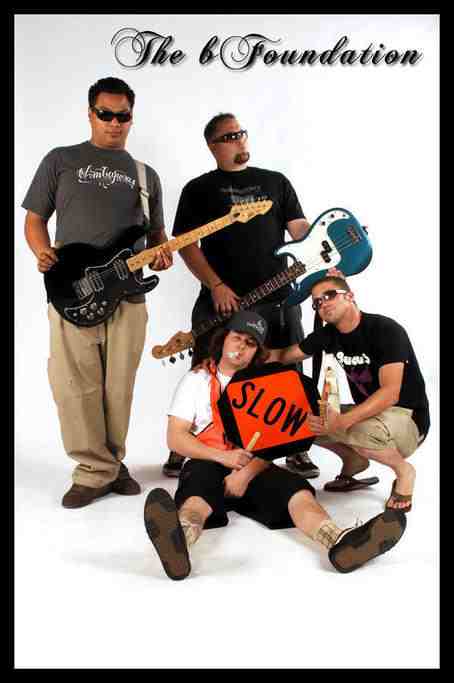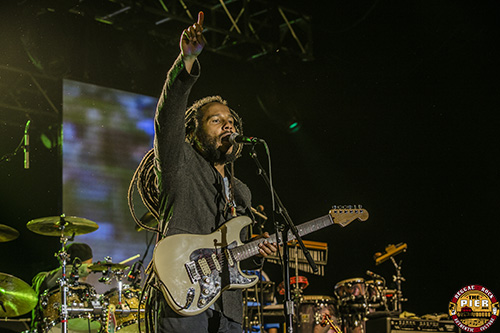Nahko & Medicine For The People – Hoka
 Track Listing:
Track Listing:
1.) Hoka
2.) Directions
3.) It Is Written
4.) All Can Be Done
5.) San Quentin
6.) We Shall Overcome
7.) Two Wolves
8.) Great Spirit
9.) We Are On Time
10.) Love Letters to God
11.) Heart Forward
12.) Tus Pies
13.) Backbone
14.) Ku Kia’o Mauna
15.) Build a Bridge
16.) Make a Change
17.) Give A Little, Get A Little
18.) Runner
19.) The Wolves Have Returned
The Pier Album Rating:![]()
Release Date: June 10th, 2016
Record Label: SideOneDummy Records
Official Website: Nahko Website
Artist Background:
Nahko identifies with many intermingling identities: Apache, Puerto Rican, and Filipino. Shortly after being born, a white family in Portland, OR adopted him and he lost all contact with his Native American heritage for over two decades. At just 17 years old, Nahko moved to Alaska for work. He then moved to Hawaii to learn farming practices. Now a bit older and more traveled, Nahko began his quest to learn about his heritage and meet his birth family, which led to learning about the family’s traumatic past, including the tragic deaths of his father, grandfather, and grandmother. Through this re-connection, coming to understand the complexities of life and pain, Nahko turned to music for healing, and also to tell stories. Simultaneously, Medicine For The People is a group of musicians from all over the nation and world, and together, the collective has been successfully gaining traction over the last half decade.
Album Review:
In an interview I did with Nahko a couple of years ago we were discussing Medicine For The People’s first album, On The Verge. “I didn’t know how to record music,” he told me. Well, not so anymore. HOKA sounds both organic and epic, as if meant for campfires as much as stadiums, and this pretty much parallels Nahko and crew’s career at this point. They are as comfortable in the woods by themselves as they are headlining festivals.
Perhaps part of the success comes from producer Ted Hutt, well-known for working with the likes of Old Crow Medicine Show. But I think Nahko has learned the power of the studio too, and also taken some creative liberties, such as having several interludes among the set, such as his uncles chanting song lyrics in the language of the Lakota, or having Hawane and Pua Case sing a Hawaiian intro to “Build a Bridge.” Perhaps five minute (on average) songs could be construed as self-indulgent, but it’s clear that Nahko’s intention is to weave his story on record: everything from his Apache heritage to his days in Hawaii, to his current life on tour.
In truth, after his last album, Dark As Night, captured the hearts of many, there were high expectations for Nahko’s follow-up, as he’d become renowned for his spiritual live performances — beyond the Bob Dylan-meets-Xavier Rudd of his lyricism. Dark As Night is indeed one of my favorite records, and it stemmed from a man and a band just on the cusp of growing too big for their fishbowl. The album was inspired, heartfelt, honest, and even though it spanned everything from near-bluegrass giddy-up to roots reggae, the album was cohesive. So could HOKA even come close?
Certainly! But beware, this is not Dark As Night the sequel. Nahko embraces Medicine For The People more fully, especially horn player Max Ribner, who consistently adds elements of American big band. (Musical legends tend to have a single horn player that kills it, i.e., Dave Matthews and Springsteen… What’s with that?)
Also, Chase Makai’s guitar has become Nahko’s instrumental echo: poetic licks and multi-genre integration (he’s the secret weapon). As for Nahko himself, he’s still exploring the variations his voice can take on, be it angry rapping, romantic cooing, or folk soul. But if Dark As Night was him coming to the Truth of his past, HOKA is a dedication to the present mission. The album title itself is a battle cry from the Lakota, as if a testament to the fight Nahko has started against the System.
Nahko has also learned much from his companions. He learned brevity is the soul of wisdom from Xavier Rudd (“Directions”), poetics is the plush of joy from Trevor Hall (“Backbone”, one of the album’s best), how to get angry and stay pop from SOJA (“Great Spirits”), and Nahko even picked up vocal softness from Dave Matthews (“We Are On Time”), and gives into the glory of this contemporary fascination with Americana, ala Mumford and Sons (“Tus Pies”).
“Tus Pies” is the album’s most breakout song, something more peaceful, more loving, and more sincere than Nahko has ever previously written. Simple and featuring Tim Snider’s classy use of violin, Nahko offers, “Who wants to wear the hat this morning?/ I reckon neither of us cares/ because there is more to life than leading/ and I would follow you, I swear.” The lyrics of this album are, honestly, some of the best.
But the most genuine and unique songs are unequivocally Nahko and Medicine For The People. “Runner” tops the list. Albeit, the instrumentation is nothing fancy, but Nahko excels at this style, (remember “7 Feathers”?). “This love has no strings,” Nahko releases; “No leash/ no clipped wings/ Stronger than most things/ it is noble by nature.” He waited a long time to write a love songs, and it pays off.
Yes, this album meets expectations. I hope Nahko stays indie for the next one, (I fear a duet with Rhianna, of something like that), but he stays true enough to his character to keep to the campfires. In that respect, Medicine For The People are successfully redefining “Americana”.
Written & Reviewed By: John Powell
[Editors Note: All reviews are reflective of the album in it’s entirety, from start to finish. These reviews are the honest opinion of each writer/reviewer expressing their feedback as a genuine fan of the music. Each star rating reflects their review of the album, NOT the band. Music is subjective. Regardless of the review or star rating, we encourage you to listen to the music yourself & form your own opinion. Spread the awareness of all music in its art & contribution]
Watch: Nahko and Medicine For The People – “San Quentin”





